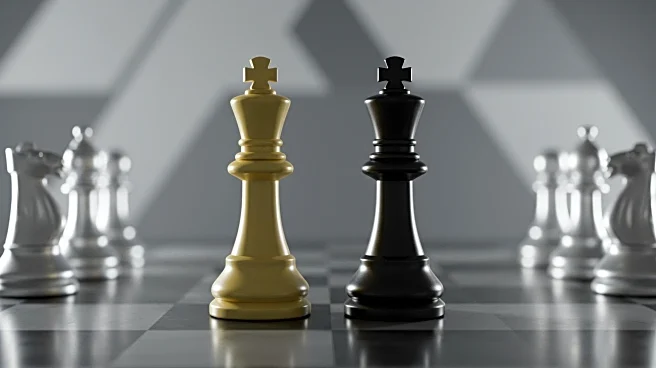What's Happening?
President Trump and Russian President Vladimir Putin are set to meet in Alaska, marking a significant diplomatic engagement aimed at resetting U.S.-Russia relations. This summit comes amid ongoing tensions due to Russia's actions in Ukraine and the imposition of heavy sanctions by the U.S. and its allies. The meeting is seen as a strategic move by both leaders to improve bilateral ties, which have been strained since the 2016 U.S. election interference and subsequent geopolitical conflicts. Putin, who is accompanied by a business delegation, seeks to charm President Trump and discuss potential investments in Alaskan oil and rare earths. The summit is also an opportunity for Putin to avoid making commitments to end the war in Ukraine, despite pressure from European allies for a ceasefire.
Why It's Important?
The summit holds significant implications for international relations and U.S. foreign policy. A successful reset of U.S.-Russia relations could alter the geopolitical landscape, potentially easing tensions in Eastern Europe and impacting global energy markets. For President Trump, improving relations with Russia could bolster his foreign policy credentials and provide a counter-narrative to the criticisms stemming from the Russia investigation during his first term. However, the meeting also poses risks, as any perceived concessions to Russia could draw criticism from domestic and international observers. The outcome of the summit could influence U.S. strategic interests, particularly in relation to NATO and its European allies, who are closely monitoring the situation.
What's Next?
Following the summit, both leaders are expected to hold a joint press conference, signaling a potential positive outcome. However, the long-term impact of the meeting will depend on subsequent diplomatic engagements and the implementation of any agreements reached. Key stakeholders, including European allies and U.S. political leaders, will likely scrutinize the summit's results, particularly regarding commitments to Ukraine and broader security issues. The potential for further negotiations or policy shifts will be closely watched, as both leaders navigate the complex dynamics of U.S.-Russia relations.
Beyond the Headlines
The summit highlights the broader strategic ambitions of both leaders. For Putin, it represents an opportunity to assert Russia's influence on the global stage and challenge Western dominance. For President Trump, it is a chance to redefine his foreign policy legacy and demonstrate his ability to engage with global powers. The ethical and political dimensions of the summit, particularly concerning human rights and international law, will continue to be debated as the implications of the meeting unfold.










